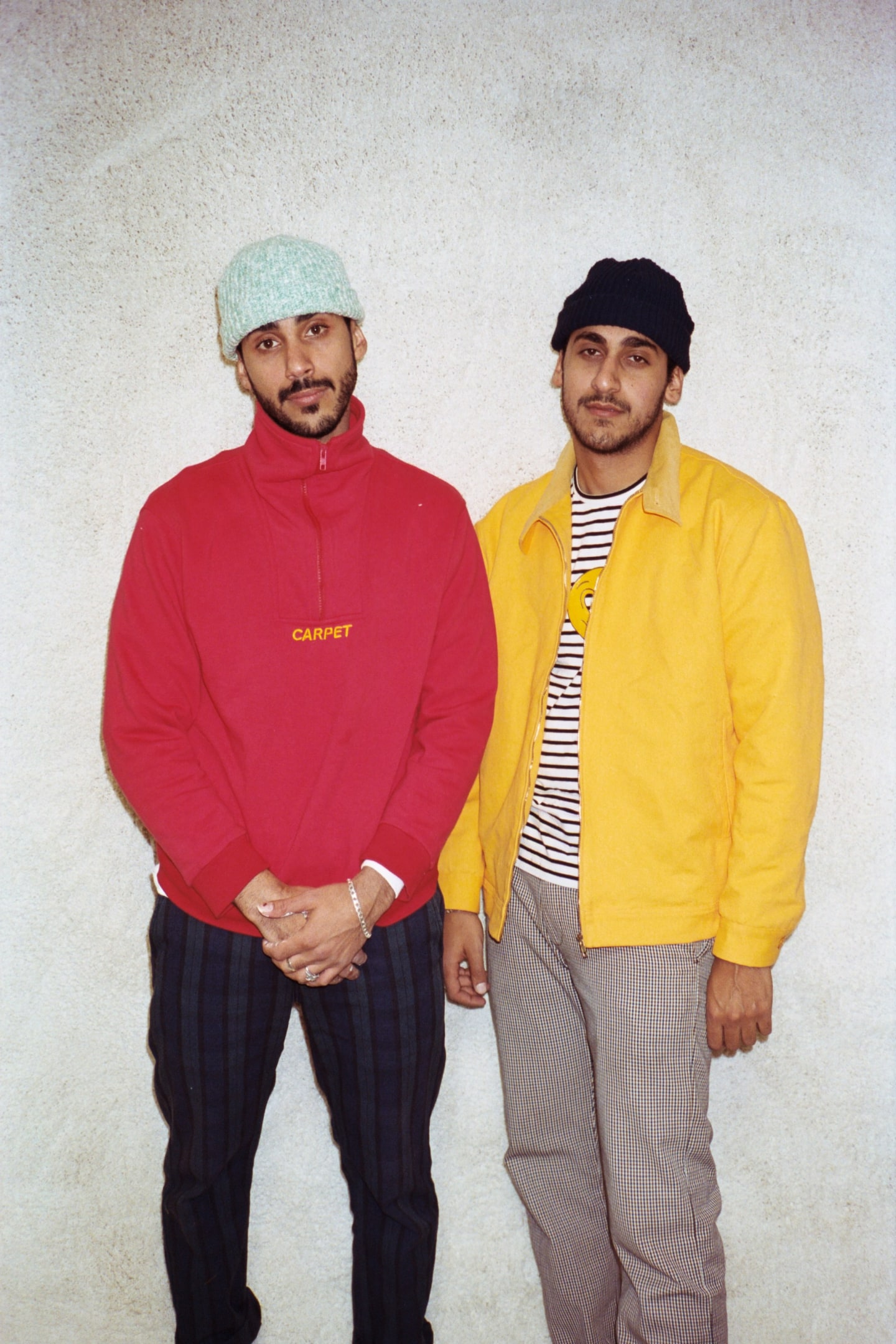 Osama and Ayman Abdeldayem of Carpet Company.
Photo by Jaz Ludwick
Osama and Ayman Abdeldayem of Carpet Company.
Photo by Jaz Ludwick
“It started out with one Instagram post,” Osama Abdeldayem, one half of Maryland skateboard and clothing brand Carpet Company, told me over the phone. “Now we've got our stuff from L.A. to New York, Europe, Japan, and Australia.” That’s a pretty incredible feat for a company that was founded a little less than three years ago by brothers Osama and Ayman Abdeldayem, 27 and 24 respectively, and began as an after-hours passion project in the basement of their parents’ Laurel, Maryland home. Especially since both of the guys have full-time jobs, and skate for Washington, D.C.’s Bureau skate shop.
On a given evening, you can jump on Carpet Company’s IG stories and see footage of the brothers (and sometimes their friends) experimenting with inks, screen printing their latest board design, putting a nutty spin on packaging, or getting in a pre-dusk skate session — all soundtracked by their favorite songs of the moment. Every item Carpet Company puts their hands on is a labor of love — something you can see happening in real time, and more importantly, can feel upon receipt.
And that’s what ultimately makes the small but mighty operation so magical, and a clear standout in the ever-growing skate marketplace. Through word-of-mouth (and the occasional shared Instagram link), people have discovered their incredibly high-quality goods, which can feel specifically made just for you. Specializing in screen-printed skateboards and clothes, Carpet personalizes each piece in some way, whether it’s a name on a board, a message sewn into a pants pocket or embroidered into the jacket lining, or a misprint turned into one-of-a-kind design quirk.
Osama and Ayman also incorporate aspects of their Egyptian muslim culture into their designs, from putting Arabic lettering on boards, to screen printing custom prayer rugs for some of the brick-and-mortar shops that stock their goods.
Ahead of the brothers’s February 17th event at the Baltimore Museum of Art, where they’ll show a few one-off designs and give a talk on their home-grown company, read a candid conversation with the duo about their start in screen printing, the importance of incorporating aspects of their culture into their designs, and how their DIY skate brand came to be.
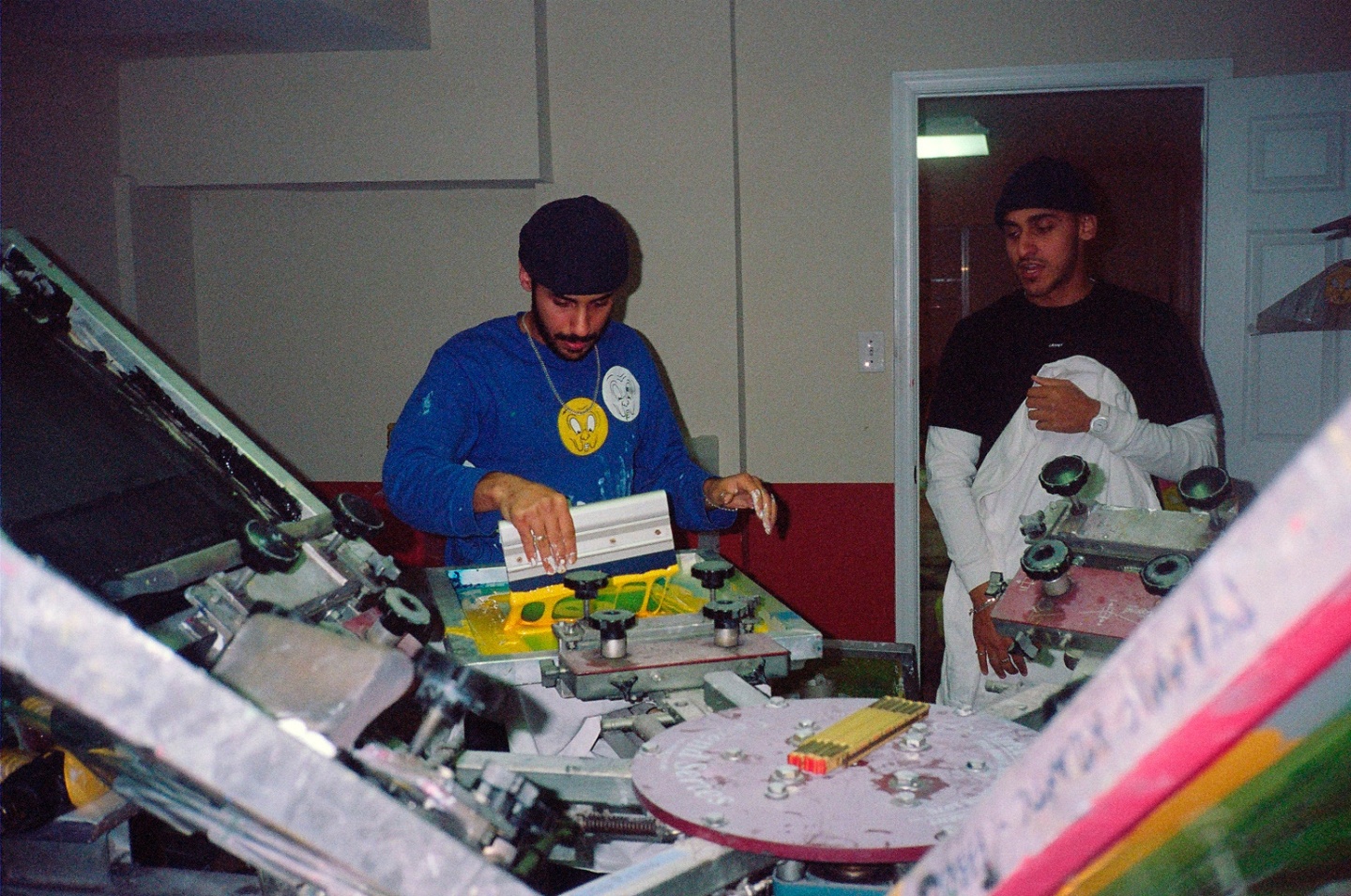 Osama and Ayman Abdeldayem
Photo by Eyal Azrad
Osama and Ayman Abdeldayem
Photo by Eyal Azrad
How did you guys get into skateboarding?
AYMAN ABDELDAYEM: We were both born in Alabama. We moved to Maryland when I turned ten, and my mom got me a skateboard from Wal-Mart the next day. We shared that for like a year.
OSAMA ABDELDAYEM: There was a lady in Alabama right before we moved [from there]. She had this small, yellow, flat skateboard. She was riding around in our mosque. We thought it was cool, so we watched and she let us ride a bit. She actually gave us one of her old skateboards, so we were riding around in our driveway maybe a month before we moved to Maryland.
When did the idea for Carpet Company occur to you guys?
AYMAN: Probably in the middle of 2015. One of our friends had a skate company. We helped him a lot with the designs, and it was really fun. We learned a lot, like how to communicate with people who produce clothes, and met a few distributors who could make skateboards for us. We were like, Oh, let's start something of our own.
OSAMA: We had the idea for a while. I think the reason it clicked is because we came up with the name Carpet Company, and we liked it so much that we got forced to start it. It felt really right. We learned from [our friend’s] company that it'd be really hard to order stuff and actually get [things printed] the [way we wanted]. We were talking about getting shirts made, but got really stressed out.
AYMAN: They were also super expensive, so we were like, Let's just screen print them on our own. We bought this raggedy screen printing machine and ruined like 150 shirts. The place where we were [printing] had no lights and it was wet. It was horrible, but from there we grew and learned how to [do things] a little better.
OSAMA: We spent so much time and energy and money. Every single day we would just meet up and stand there for five, six hours while we'd mess up so much stuff — chemicals and ink everywhere. Then we’d go back home — well, Ayman would go home, and I would just go back to my room and watch more [screen printing] videos.
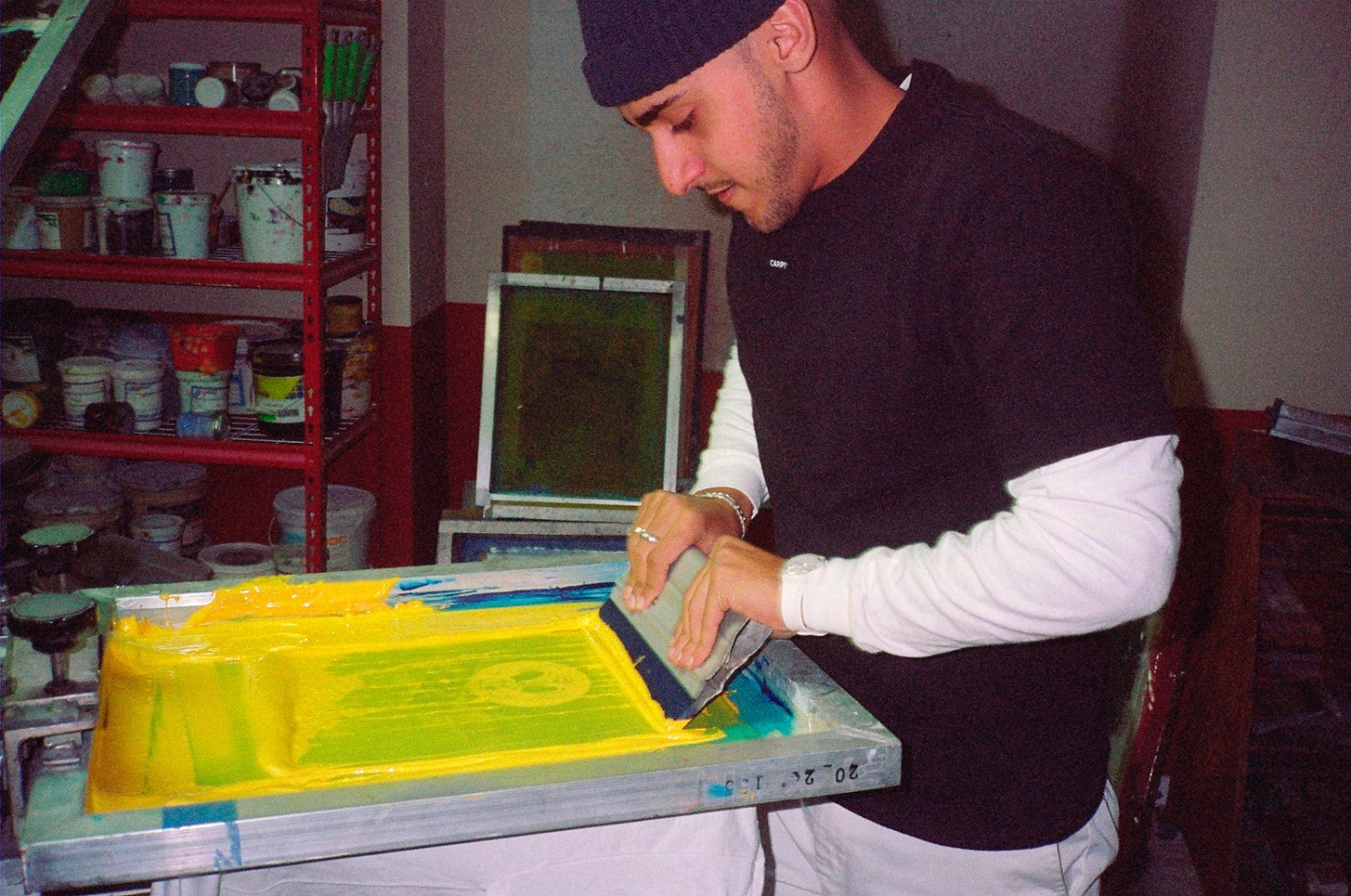 Ayman screenprinting.
Photo by Eyal Azrad
Ayman screenprinting.
Photo by Eyal Azrad
When did you start to figure out your production process?
AYMAN: We're still figuring things out! Every season things get easier. Earlier this year, that's when things finally started to pick up like, Alright. We got this.
OSAMA: The best part about it is the fact that we like to experiment and we're not really scared to make mistakes. When we do make mistakes, I'll get bummed out about it and then Ayman will look at it sideways and shift his head and go, "You know what, it's kind of sick." And I'm like, "You know what? It is kind of sick." So we'll take a mistake and mix it with a whole bunch of other mistakes and add some glitter to it and the next thing you know — we just made something that people really like.
Did either of you have a background in design?
AYMAN: I always liked that stuff but, honestly, I graduated [with a degree] in information systems. I work in it now, and Osama graduated [with a degree] in math and engineering, and he's working in that now. When we were young, we used to be very into people who do good quality stuff, old New York brands like 10 Deep and Mishka, Alife. We were also very into bougie stuff, like BAPE and Ice Cream, Evisu jeans.
We never got to afford high-end stuff like Gucci and Louis Vuitton, but whenever we'd see it, we'd be those weird guys that would walk by and rub it with our finger, like, "Yo, did you feel that canvas," or "Look at this leather." We'd pay a lot of attention to the detail and the way [those designers] layered things, and come up with our own ideas based off their graphics. It stuck with us.
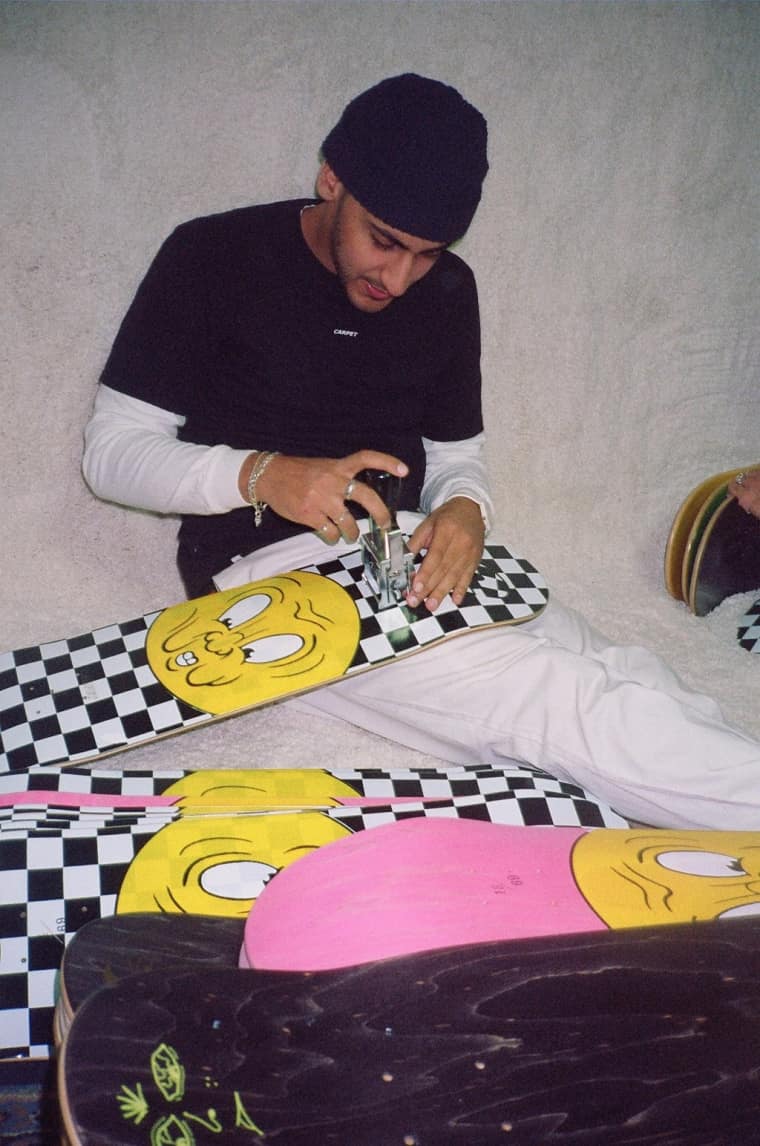 Ayman Abdeldayem
Photo by Eyal Azrad
Ayman Abdeldayem
Photo by Eyal Azrad
 Ayman Abdeldayem
Photo by Eyal Azrad
Ayman Abdeldayem
Photo by Eyal Azrad
So your basement workspace is at your parents house? How do they feel about your business? Are they stoked?
OSAMA: Yeah, they're upstairs. Our dad, he's a scientist. A PhD in physics, NASA dude.
AYMAN: He's literally a rocket scientist.
OSAMA: He still yells at us, like "Why do you call it Carpet Company? You need to call it Skateboard Technician." His main argument is that when [people] Google “Carpet Company,” they will not find us.
AYMAN: He likes the process, because there's science in it.
OSAMA: In the beginning, I would ask [my dad] these questions — he didn't know anything about screen printing — like, "Hey Baba, if I need to burn something that needed ultraviolet light, what frequency is the best to use?" And he'd be like "Use 560 nanometers but make sure you stay away. It could give you cancer." He gets excited about it now because he sees where we started and he sees what we've produced from what we've built ourselves.
My mom actually helps a lot. Honestly, she saves hours. When we finally come out with our stuff, last season, [our mom] literally sat down watching Shark Tank and then just folded shirts and put them in bags with little art badges on it.
What does the basement factory look like? What all is in it?
OSAMA: It looks like a hot mess. Imagine a very basic family basement. It was unfinished, but then we finished it, and made it disgustingly unfinished again. We covered the walls with a plastic resin so that when we wash stuff, the water doesn't penetrate through the drywall. It’s where the screen printing machine, the exposure unit, the dark room, the pressure washer is. The other [room] is where we do everything and print the skateboards. It's a pretty bad setup, but it works somehow.
When we do make mistakes, I’ll get bummed out about it and then Ayman will look at it sideways and shift his head and go, “You know what, it’s kind of sick.” And I’m like, “You know what? It is kind of sick.”— Osama Abdeldayem
As your design and production is so hands-on, what’s the process like from start to finish on one product?
AYMAN: A board takes a long time. If we have an idea or see something cool we like, we'll play with it on Photoshop. Sometimes, I'll draw something, scan it, and send it to Osama, and then he'll mess with it and make it look ten times better. From there, after we make the screens, we'll print a color at a time on the boards. After, we'll do the top graphic, and then we'll number and gloss them. If you were to buy one online, we'll stamp your name on top of the board. From start to finish, I'd say each skateboard itself has probably …
OSAMA: five to eight hours of hands on them. The most complicated things we do are jackets, hoodies, or jeans. For example, the jeans we made had so many different details that we had to order [multiple pieces] from different places, and make so many different tags. [Each piece of the pants had] random stories to them and you'd read them and go, Wow, when did you find the time to come up with this, and the different buttons and everything? It’s a lot of planning, and it's a very slow process.
Where did the approach to include so many small, story-telling details come from? Why does that matter to you guys?
OSAMA: I appreciate small detail. I went to the Hermes store to buy my friend a tie, and it was expensive for me. But when I watched them present the tie in the packaging, it made me feel really special. The lady at the register rolled it up nicely and put it in this box. Then she tied the box up with this string, put hang ties with stickers, signed her name, stamped the receipt, and then put [the box] in this really nice bag with Hermes-printed paper in it. I felt like I was getting something very, very worthy. I just bought a tie, but the high quality of the presentation [makes] people feel special.
That had an effect on me when I was working with Ayman and coming up with ideas. They're not coming to a store and we're not doing it for them in person, but we've got to make sure that they receive the package and feel really special. We don't really put that much stuff on [shirts] but when we send [them out] we put them in a really nice fabric and sew the bag, or we'll make a bag from scratch. It's the presentation, to make people feel special, because people are special. People don't know that when they order an item [from us], but then when they get it, it's like No wonder why I paid whatever. It's like, "Oh cool. They spent their time on this."
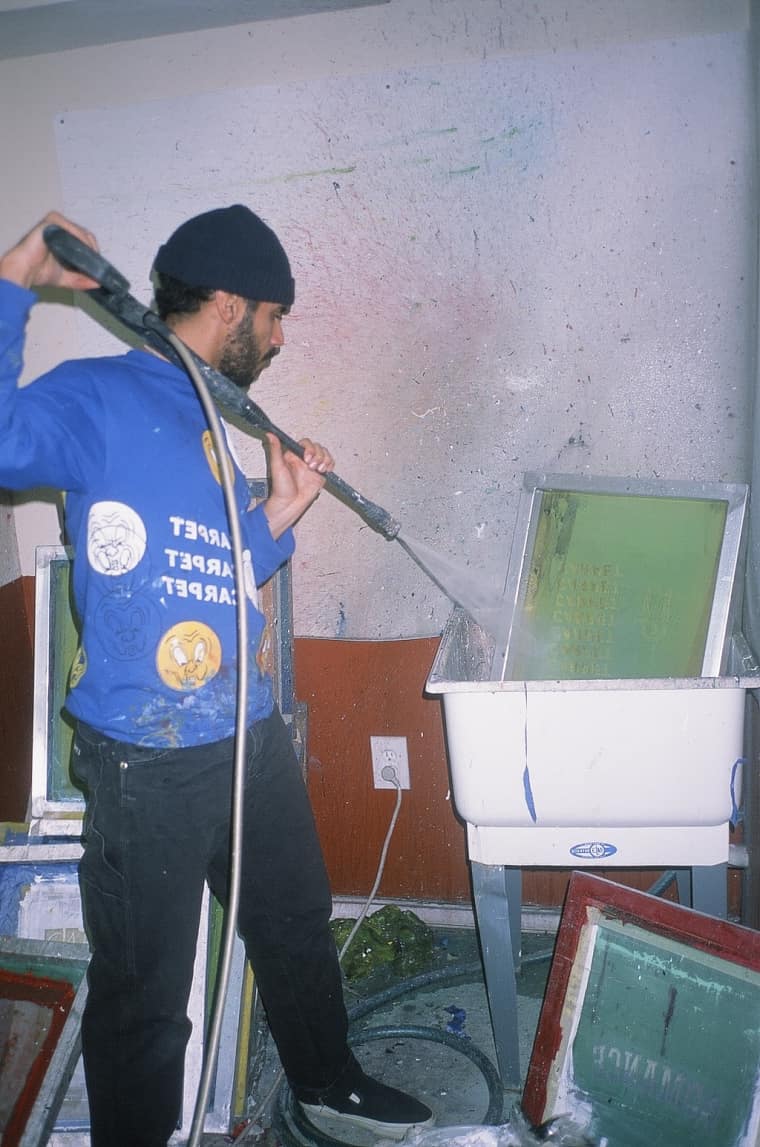 Osama Abdeldayem.
Photo by Eyal Azrad
Osama Abdeldayem.
Photo by Eyal Azrad
 Osama Abdeldayem
Photo by Eyal Azrad
Osama Abdeldayem
Photo by Eyal Azrad
What are each of your day jobs? How do you balance both things?
AYMAN: I work at NASA. My title is missions operation network engineer, but really I just be chilling. I mean, I go to work every day but I'll come home and then I'll get to work until midnight or 1 or 2 a.m. with Osama. It does suck balancing that.
OSAMA: And I work at the utility company for D.C. and Maryland. It's called Pepco. I have a team of designers who work under me and whatever anybody needs, I'll have my team go out and review the site and design everything, and I'll approve it and send it to construction. We'll text each other basically every day and be like, "What time are you coming home?" I'll have a crazy long day of work and then go home and just sit on the couch, and then Ayman pops up. We'll just drink some tea or eat something really quick and next thing you know, we're downstairs and it's…
AYMAN: 1 a.m. again.
Why is it important to you guys to include aspects of your culture in what you create?
OSAMA: The Arabic, Middle Eastern look in skateboarding was never really tapped into, you know? We actually have a reason to do it because we're fellow brownies. We like the way it looks, and no one can hate on us for doing it because that's actually what we are. No one even knows what it says. Usually when someone sees Arabic, they associate it with something pretty bad, so now when they see a really cool board graphic, art, and time and dedication from people that they like to watch, they associate it with something better.
 Osama Abdeldayem
Photo by Eyal Azrad
Osama Abdeldayem
Photo by Eyal Azrad
 Osama Abdeldayem
Photo by Jaz Ludwick
Osama Abdeldayem
Photo by Jaz Ludwick
Where did the idea come from for the turmeric deck?
OSAMA: It was a one-minute decision. We wanted to make a curry yellow, but Ayman was like, "Dude, let's add the spice in it." We never did any research about it. We didn't know that the ink would actually get affected by it — it made some kind of negative aspect in the curry spice that actually messed with the ink but we don't really care. It was like, Dude, just put it on there and once you gloss it, it will be all good. It will be sealed tight. The basement literally smelled so bad for three weeks.
And the prayer rugs?
OSAMA: For every new store that bought stuff from us, we would do a prayer rug to give that store a gift. We did it for probably 20 or 25 stores. Last season [we] stopped because there was just too much going on. We're still thinking about making more. We just really like seeing stuff that has a lot of skill in it. If you just look at a prayer rug, it's like, Dude, how did they even make this? I really like going to different countries and finding unique pieces.
AYMAN: Yeah. A lot of them are hand made.
OSAMA: We actually pray a lot. We pray five times a day, but we didn't really [make the prayer rugs] based off any religious practice. We basically saw them and we were like, "Man, these are very beautiful and I'm sure every shop would want to have one with their name on it."
The skate market of late has been getting pretty crowded with new brands. How do you guys stay motivated in the face of that?
AYMAN: I don't mind it at all actually, but it is getting really crowded. We just do our own thing, and we have a lot of people who look up to us, who ask questions and for advice. I get really excited to help people out. There's people who have done [this] way before us. We watch their videos to get knowledge. Recently a lot of people have been hitting us up saying, "Man, we really look up to you. You're bringing skateboarding back." I don't know what that means.
 Ayman Abdeldayem
Photo by Eyal Azrad
Ayman Abdeldayem
Photo by Eyal Azrad
What is your ultimate goal for Carpet Company and what does the future look like for you guys?
OSAMA: I think we want to keep making the same stuff we make now, just figure out how to make it in higher proportions — or maybe not. There's going to be a limit where we just can't make more. We're not really looking to make infinite items so everybody can have one.
AYMAN: We don't want to lose that handmade feel. I'm not saying we won't [make more of everything], but I don't want to get there, if that makes sense.
OSAMA: We don't want to toss around quality for cost.
Do you guys have plans to move from the basement factory?
OSAMA: We got a place in Baltimore. It's a commercial building. From all the money we made from last season, we just said, "Let's buy a place and get out of here." It's in this okay part of Baltimore, and hopefully with whatever [money] we make this season we can fix it up and, in the next couple of months, move everything there and have more space to work and have storage. Plus, we'll feel more comfortable having people over to see things and help us out. I mean, bringing people over to your parents' basement is not really that fun. You can't really be that tough guy or that cool guy when your mom is yelling at you to get mint from the front yard.
 Osama and Ayman Abdeldayem.
Photo by Eyal Azrad.
Osama and Ayman Abdeldayem.
Photo by Eyal Azrad.